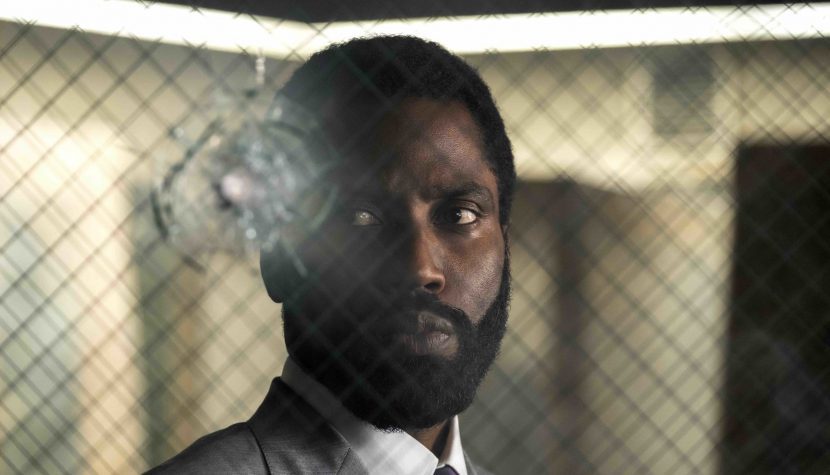TENET. At times full of sensations, at times empty

Several release delays, a plot shrouded in mystery, and a $205 million budget. After a long wait and a blockbuster drought, Christopher Nolan’s new filhm hit screens in 2020, and cinemas around the world were counting on improving their financial situation. So what is Tenet like?
Nolan returns to one of his flagship themes, which is time. In Memento, he distorted the chronology of the presented events, in Interstellar he depicted the relativity of time in space, in Inception he created a fantasy about traveling through dreams and dimensions, and in the Dunkirk soundtrack he integrated the ticking of the clock, effectively generating tension. In Tenet, on the other hand, the heroes stumble upon an astonishing technology sent from the future: bullets with distorted entropy, where effect precedes cause. First there is a hit, then a shot… Unknown technology can turn out to be extremely dangerous, which is why we follow the nameless Protagonist (John David Washington) on a grand journey to solve this mystery.

Does Tenet convince viewers? I have my doubts. Nolan, even for himself, is here very hermetic, confusing, requiring one hundred percent concentration from the viewer. One screening may not be enough to understand all the scenes. Unfortunately, this difficulty of form does not go hand in hand with the depth of the message. Fans of the “more ambitious” Nolan may be a bit disappointed that Tenet does not provoke too many questions. The pro-ecological thought at the end stops at the level of cliché, and scientific digressions – inaccessible, recited formulas. The extremely interesting issue of going back in time was treated only as a pretext for visual and formal games. Is that an allegation? Not necessarily – I would just expect a bit more from more elaborate fantasies on a similar topic (Dark), as well as from Christopher Nolan himself. Artificial dialogues and pompous declarations alone will not conjure up an intelligent cinema.
Related:
But I was on pins and needles the entire time. Tenet masterfully builds tension, or rather: keeps the same dizzying pace all the time, a sense of danger and stuffy atmosphere fueled by a cold-brown color palette. In this exuberant spectacle, the characters look more like figures thrown from action to action than real people. However, this cannot be called a shortcoming, but rather the effect of a conscious focus on the action, not on the psychology of the characters. In the characters of individual characters, there is a comic strip, and the film itself shows the director’s love for James Bond, to which he admitted openly. This is basically a fireworks story about a secret mission. The protagonist therefore has almost superheroic features, superhuman endurance and the ability to regenerate, he can make a joke even in the worst moments, and he masters innovative technologies in a second. The antagonist, performed by Kenneth Branagh, speaks in a heavy Russian accent, is almost cartoonishly angry and lacks any convincing motivation. Out of the cast, Robert Pattinson is by far the best as the nonchalant physicist; Michael Caine also has an interesting episode.

Everything that is weaker loses its importance anyway when we are sitting in Imax, absorbed by image and sound. Cinemas will stand for such shows for a long time and will not be replaced by streaming platforms and screenings at home. Such a film is like a reward for months of waiting for the opening of cinema halls. Already in the first scene, Tenet throws us into the heart of the action and leads us in its nervous rhythm for almost the entire two and a half hours. The soundtrack by Ludwig Göransson mixes with the sounds of running away and gunshots, violence and fighting seem tangible, we feel the fist blows almost on our jaws, and all the “time-reversed” scenes and characters interest us with the motor of movement and the concept itself. The impression of realism and immersion of this unreal world is another proof of the power of practical solutions and resignation from the green screen. The director himself stated that in the average romantic comedy we will find more computer special effects than in Tenet. In addition to Nolan, the visual beauty of the film is mainly due to editor Jennifer Lame, cinematographer Hoyte van Hoytema and FX specialist Andrew Jackson – perhaps only Dune provided us with something equally impressive from a technical point of view that year. The opera’s opening shootout, [SPOILERS] chasing a car going backwards, a duel with an “inverted” alter ego, rope jumping on a skyscraper, simultaneous attack by two squads from different timelines, a plane colliding with a building [SPOILERS END], but also and breathtaking shots of subsequent locations: these scenes will stay with me for a long time.
Tenet is therefore a film in a straddle, split like its characters. On the one hand, a 100% action movie focused on sensations, but afraid to bet on this action entirely with consistency worthy of Mad Max: Fury Road. A film with aspirations and a number of difficult concepts from the world of physics, but not delving into these problems, but only gliding over them. At times full of sensations, at times empty. This is, after all, and above all, another “nolan”, the next chapter in the director’s filmography, who for years has been developing his own vision of the ambitious mainstream, combining science with the popular, and spectacular with the obscurantist. Do his interests move away from people and towards effects? It looks like it. HOW it looks is another story.





